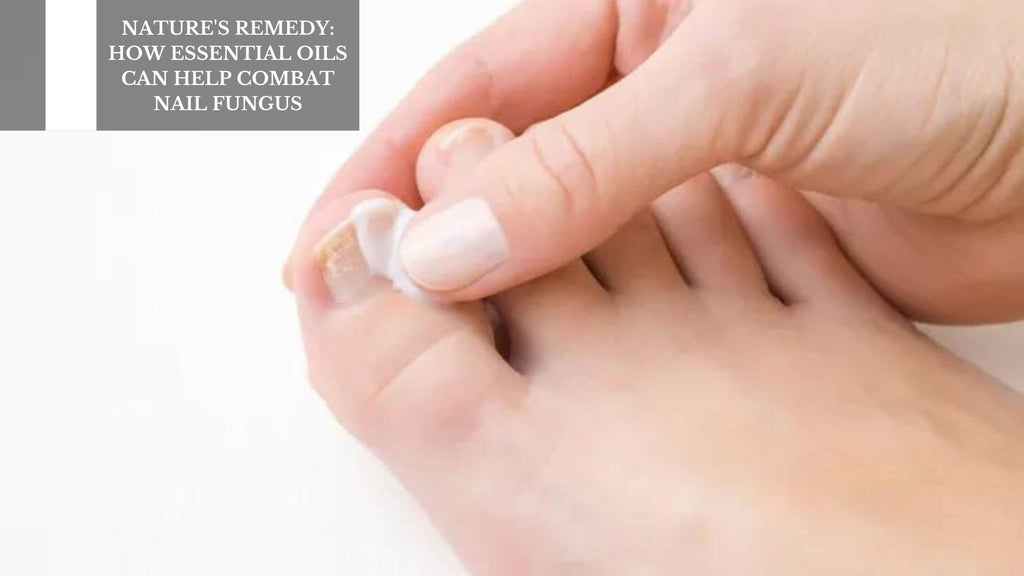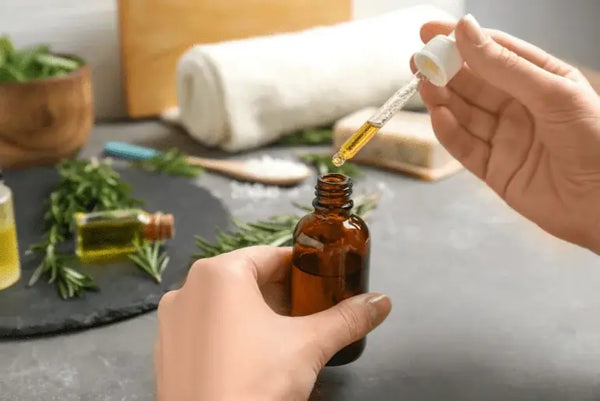Nature's Remedy: How Essential Oils Can Help Combat Nail Fungus

Healthy nails are an essential part of our overall well-being. However, sometimes we can fall prey to nail fungus, which can be both unsightly and uncomfortable. Traditional antifungal treatments can be expensive and have side effects. Fortunately, there are many natural remedies available for treating nail fungus, including the use of essential oils. Essential Oils are a great alternative to traditional treatments because they are natural, safe, and effective. This pesky fungus can lead to discolored, brittle, and thickened nails, causing discomfort and embarrassment for those affected. The most common causes of nail fungus include poor hygiene, walking barefoot in public places like pools or gyms, wearing tight-fitting shoes, and having a weakened immune system.
You may aslo like:
Additionally, certain factors like diabetes, aging, and a history of athlete's foot can increase the risk of developing nail fungus. While there are various treatment options available, many individuals are turning to natural remedies, specifically essential oils, to combat nail fungus effectively. One of the key benefits of using essential oils is their ability to penetrate deep into the nail bed and reach the source of the infection. Unlike synthetic treatments, essential oils work holistically, targeting the fungus while also nourishing and strengthening the nails.
Best essential oils used for nail fungus
1. Tea tree essential oil
This essential oil possesses powerful antifungal and antibacterial properties that can effectively combat nail infections. One of the key components of tea tree essential oil is terpinene-4-ol, which has been scientifically proven to possess antifungal activity against various types of fungi. When applied to the affected nails, tea tree essential oil works by penetrating deep into the nail bed, targeting the underlying fungal infection. To use tea tree essential oil for nail fungus, start by thoroughly cleaning and drying the affected nails. Next, dilute the tea tree essential oil with a carrier oil, such as coconut or olive oil, to prevent any potential skin irritation. Apply the diluted mixture directly onto the infected nails using a cotton swab or a clean brush, making sure to cover the entire nail surface and the surrounding skin. It is recommended to repeat this process twice daily for several weeks to see noticeable improvements.
2. Eucalyptus essential oil
Eucalyptus essential oil is a refreshing and invigorating essential oil that has long been used for its medicinal properties. When it comes to treating nail infections, eucalyptus essential oil is a fantastic option to consider. One of the key benefits of eucalyptus essential oil is its powerful antifungal properties. This makes it an excellent natural remedy for nail fungus. The oil contains compounds such as cineole and terpinen-4-ol, which have been shown to effectively combat fungal infections. To use eucalyptus essential oil for treating nail infections, simply dilute a few drops of the oil in a carrier oil such as coconut oil or jojoba oil. Gently apply the mixture to the affected nails using a cotton ball or swab. The oil will penetrate deep into the nail bed, targeting the fungus and helping to eliminate it. Additionally, eucalyptus essential oil offers a refreshing scent that can help combat any unpleasant odors associated with nail infections.
3. Clove essential oil
This essential oil possesses powerful antiseptic properties that can effectively fight against the fungi responsible for nail infections. Clove essential oil contains a compound called eugenol, which exhibits antifungal, antiviral, and antibacterial properties. These properties make it an ideal choice for treating nail fungus and preventing its recurrence. Applying clove essential oil directly to the affected nails can help eliminate the fungus and promote healthier nail growth. To use clove essential oil for nail fungus treatment, start by diluting it with a carrier oil such as coconut oil or olive oil. This helps prevent skin irritation and ensures safe application. Mix a few drops of clove essential oil with a tablespoon of carrier oil and gently massage the mixture onto the affected nails and surrounding areas. Clove essential oil not only combats the fungus but also soothes any inflammation or discomfort associated with the infection. Its pleasant aroma adds to the overall experience, making it a popular choice among those seeking natural remedies.
4. Thyme essential oil

Thyme essential oil is a powerful essential oil with a wide range of benefits, including its effectiveness in preventing nail fungus. Derived from the Thymus vulgaris plant, thyme essential oil has been used for centuries for its antifungal and antibacterial properties. When it comes to nail fungus prevention, thyme essential oil can be a game-changer. Its active compound, thymol, has been proven to inhibit the growth of various fungi, including those that cause nail infections. By incorporating thyme essential oil into your nail care routine, you can create an inhospitable environment for fungus, promoting healthier and stronger nails. To use thyme essential oil for nail fungus prevention, you can dilute a few drops of the oil in a carrier oil, such as coconut or jojoba oil. Aside from its antifungal properties, thyme essential oil also possesses additional benefits for overall nail health. It is known to have antiseptic and antimicrobial qualities, which can help combat bacteria and germs that may lead to nail infections.
5. Lemon essential oil
Known for its strong anti-fungal and antibacterial properties, the lemon essential oil can effectively fight off the pesky fungus that may be causing your nails to look unhealthy. Derived from the peels of fresh lemons through a process of cold-pressing, lemon essential oil contains high levels of limonene, a compound known for its antifungal activity. This makes lemon essential oil an excellent choice to help eliminate nail fungus and promote healthy nail growth. To use lemon essential oil for nail fungus, simply dilute a few drops of the oil in a carrier oil like coconut oil or olive oil. Gently apply the mixture to the affected nails using a cotton swab or a clean brush. Allow the oil to penetrate the nails and surrounding skin, and let it sit for at least 15 minutes before rinsing off. Apart from its antifungal properties, lemon essential oil also has a refreshing and invigorating scent that can uplift your mood while treating your nails.
You may also like:
FAQs
1) How to use essential oils for nail fungus treatment?
Essential oils are highly concentrated and can be too strong to apply directly to the affected area. Mix a few drops of your chosen essential oil with a carrier oil such as coconut oil or olive oil. This will help to reduce the risk of any skin irritation. Before applying the essential oil mixture, make sure to cleanse the affected nails and surrounding areas thoroughly. Use a gentle soap and warm water to remove any dirt or debris.
2) Do sun rays affect the sensitivity of essential oils?
Some essential oils, such as citrus oils like lemon or bergamot, can cause photosensitivity when applied to the skin. This means they can increase the skin's sensitivity to sunlight and potentially lead to sunburn or skin damage. Avoid exposing treated areas to direct sunlight for 12-24 hours after applying these oils. Choose high-quality essential oils from reputable brands to ensure their purity and effectiveness. Look for oils that are labeled as 100% pure and undergo third-party testing for quality assurance.


Leave a comment